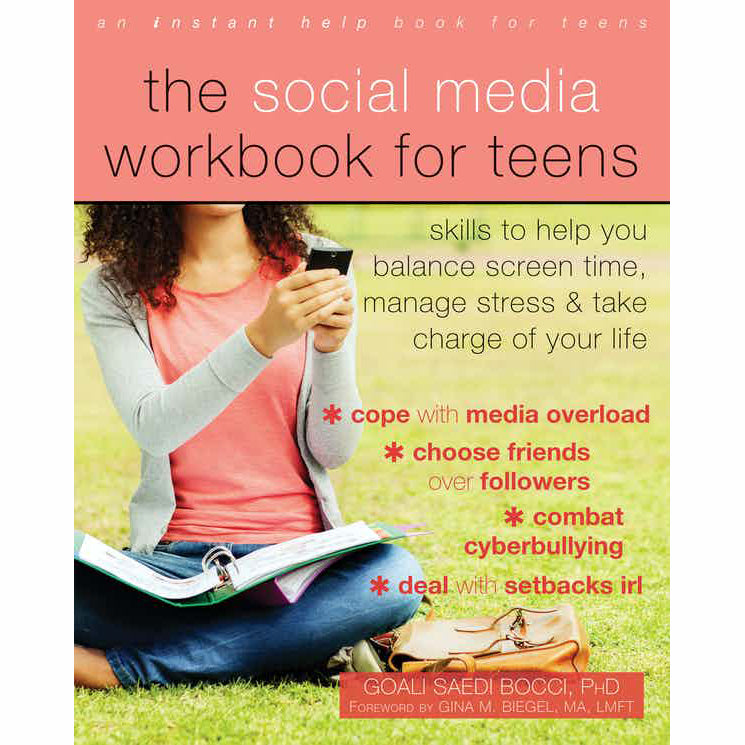
The Social Media Workbook for Teens
- Low stock - 1 item left
- Ships within 72 hours
Skills to Help You Balance Screen Time, Manage Stress, and Take Charge of Your Life
by Goali Saedi Bocci Foreword by Gina M. Biegel
Is social media stressing you out? Written by a millennial psychologist and media expert, this workbook offers practical skills to help you reduce anxiety, balance screen time, deal with cyberbullies, and take charge of your life.
Social media has drastically changed how we communicate with one another. In many ways this is a good thing. For example, it’s easier than ever to stay connected to family and friends who live far away. But social media can also become addictive, stressful, and even alienating. If you’re like many teens, you probably check your smartphone several times throughout the day to stay up to date on the news from friends. But what happens when you’re so worried about missing the latest posts on your feed that you end up missing out on real life adventures and connections?
Grounded in evidence-based cognitive behavioral therapy (CBT), this unique and relatable workbook will help you manage the stress and anxiety that can result from excessive screen time. You’ll discover how to choose friends over followers, find tips for navigating cyberbullying, and discover new ways to get back in touch with your own life—without your smartphone or other devices.
Social media has an important place in your life—but it shouldn’t rule your life. It’s also important to remember that the “highlight reels” you see of your friends’ lives aren’t necessarily the “real” truth. If you’re ready to reduce social media stress, gain confidence in yourself, and become more engaged in the world around you, this workbook will show you how.
Softcover, 152 Pages. 8 x 10 x 0.33 inches.
New Harbinger Publications. Printed in the United States.
Reviews:
“Heads up! That’s Saedi Bocci’s shout out to teens and their parents. Look up from your screens and live. And, the simple and sensible strategies in The Social Media Workbook for Teens will help teens and parents do just that. Highly recommended.”
—Michael A. Tompkins, PhD, ABPP, codirector of the San Francisco Bay Area Center for Cognitive Therapy; assistant clinical professor at the University of California, Berkeley; and coauthor of The Relaxation and Stress Reduction Workbook for Teens
“This book is for typical teens (and adults) who frequently experience FOMO, stress, low self-esteem, and sadness when using social media. The book offers simple steps for choosing when and how to use social media. This book will support you in finding more happiness and freedom both online and IRL.”
—Amy Saltzman, MD, author of A Still Quiet Place for Teens
“A helpful and realistic resource for navigating an increasingly complicated world!”
—Christopher Willard, author of Growing Up Mindful, and faculty member at Harvard Medical School
“Saedi Bocci provides a thoughtful, detailed, and considerate approach to a timely and challenging topic. She offers a rational and clinically informed approach to behavior change in coping with the ‘downsides’ of social media and its unintended, psychologically invasive consequences. The book provides an overview and detailed self-help manual for young readers (including parents) to learn about the problem, to examine their own behaviors with social media, and to gain a better understanding how it can profoundly influence their lives. More generally, Saedi Bocci supplies a template for future research to evaluate the optimal means of addressing these expanding concerns about the adverse effects of social media upon younger—and probably also older—individuals.”
—Scott M. Monroe, William K. Warren Foundation professor in the department of psychology at the University of Notre Dame
“Teens need this book! The Social Media Workbook for Teens is an excellent source that promotes mindful device use and social media participation. The book is user-friendly with deep, guiding questions for teens needing to balance their online presence with off-line recreational activities and face-to-face interactions. The book fills teens’ toolboxes with tips, a process for creating action and backup plans, as well as the encouragement of self-care.”
—Joanne Broder, PhD, former president of the Society for Media Psychology and Technology, device management and intelligence; editor of Psychology of Popular Media Culture; and author of Finish Your Dissertation, Don’t Let it Finish You!

